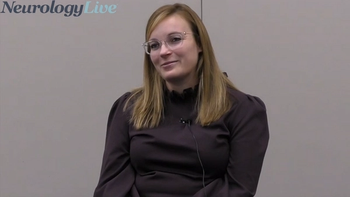
Yumanity Therapeutics announced the hold, which was in response to an investigational new drug application submitted to the FDA in December 2021.

Yumanity Therapeutics announced the hold, which was in response to an investigational new drug application submitted to the FDA in December 2021.


The trial is a twin of ENSURE-1, which began in November 2021, and is supported by positive clinical data from the phase 2 EMPhASIS trial.

Zhittya Genesis Medicine announced the trial to evaluate its biological drug, FGF-1, which is administered via an intranasal delivery device, in a cohort of individuals with mild to moderate ALS.

The director of the CHOP Pediatric Headache Program commented on the commonality of migraine in children and the need to improve diagnostic practices. [WATCH TIME: 4 minutes]

In cases with reported behavioral variant AD, investigators observed AD-like pattern with relative frontal sparing and a relatively more behavioral variant frontotemporal dementia-like pattern with both posterior and anterior involvement.

The staff epileptologist at Cleveland Clinic’s Epilepsy Center detailed the benefits seizure apps provide for patients with epilepsy, as well as the barriers that limit them. [WATCH TIME: 3 minutes]

The research director and staff scientist at Cleveland Clinic’s Epilepsy Center provided an inside look at the ways MR fingerprinting can provide real-time clinical benefit for physicians and patient care.

Investigators suggest that sex-specific strategies should be invoked to reduce the amount of early stroke deaths after observations suggest that female sex is linked to lower risk of stroke-related events.

David Fischer, MD, neurocritical care fellow at Massachusetts General Hospital and Brigham and Women’s Hospital, outlined findings from a recent study that evaluated hospitalized patients with COVID-19 who were not regaining consciousness.

The professor of neurology at NYU Langone Grossman School of Medicine discussed future research for neurological complications in patients hospitalized with COVID-19 infection. [WATCH TIME: 4 minutes]

Following the publication of data suggesting that EBV is a leading cause of MS, the director of the Ochsner MS Center and an investigator in an EBV-specific therapy clinical trial offered her reaction to the data.

The research director and staff scientist at Cleveland Clinic’s Epilepsy Center discussed opportunities for MR fingerprinting to expand, both in the epilepsy field and in general neurology. [WATCH TIME 3 minutes]

Habits of moderate-to-vigorous exercise were preferentially associated with slower decline of postural and gait stability, and work-related activity levels were primarily associated with slower deterioration of processing speed.

Investigators measured p-tau181 and p-tau231 levels with in-house single molecule array assays and cognition with the Mini-Mental State Examination.

Those who had crossovers of ALS and frontotemporal dementia had structural and functional resemblance to the patterns of damage of those with only behavioral variant frontotemporal dementia.

Becky Tilahun, PhD, a clinical psychologist at Cleveland Clinic, offered insight into a recent study she and colleagues conducted exploring CBT-informed psychotherapy for patients with psychogenic nonepileptic seizures

A recent study found that blood markers of brain damage were higher in patients with COVID-19 than in those with Alzheimer disease. [WATCH TIME: 4 minutes]

Here's what is coming soon to NeurologyLive®.

The research also identified small subcortical cerebral amyloid angiopathy-associated acute ischemic stroke lesions as risk factors for death in these patients.

The neurocritical care fellow at Massachusetts General Hospital and Brigham and Women’s Hospital highlighted areas for future research to better understand disorders of consciousness associated with COVID-19. [WATCH TIME: 2 minutes]

Regions typically affected by Alzheimer disease-related neurodegeneration were similarly protected by the carriership of at least 1 ε2 allele, regardless of their load.

The combination of diagnostic tests lateralized MRI-negative temporal lobe epilepsy with greater than 80% accuracy, offering considerable gain over visual radiologic assessment.

The results, which included data from more than 7000 patients with ET and almost 500,000 individuals overall, may help identify new common genetic risk factors for ET.

Neurology News Network for the week ending January 15, 2022. [WATCH TIME: 4 minutes]

Expert clinicians offer their insight on costs of Alzheimer drug development, a new agent for generalized myasthenia gravis, migraine in the emergency department, educational sleep medicine “boot camps”, AES 2021, and more.

The data, which included information from more than 10 million adults collected over 20 years, lend credence to a long-held theory in the field.

Take 5 minutes to catch up on NeurologyLive®'s highlights from the week ending January 14, 2022.

The clinical psychologist at Cleveland Clinic provided insight on the tricky nature of diagnosing a patient with nonepileptic seizures and the difficult conversations that can ensue. [WATCH TIME: 3 minutes]

The authors noted that the findings indirectly support the use of highly effective disease-modifying treatments from the early stages of disease in those with pediatric-onset MS, even in the absence of persistent physical disability.